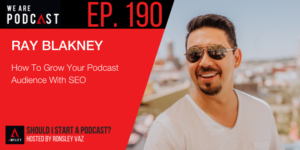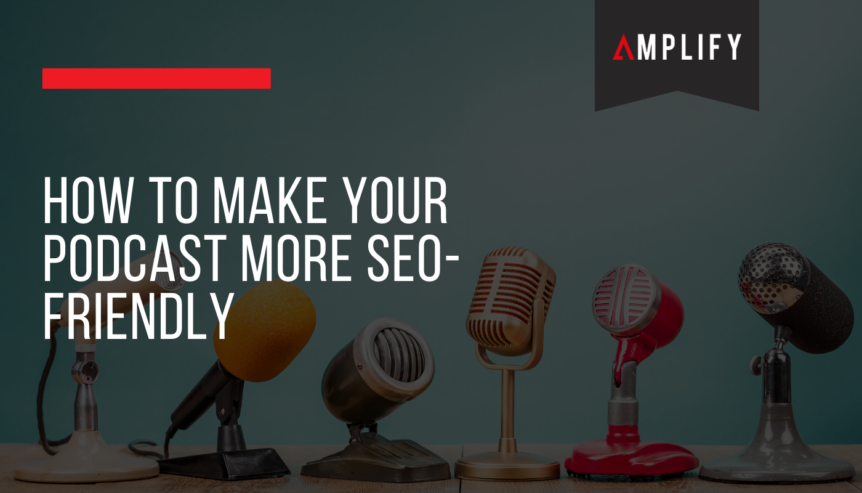A podcasters life isn’t always smooth sailing. This relatively new audio medium means that we often have to compete with the ever trending blogs and videos. Now that podcast popularity is soaring, we even have to compete with each other.
With so much content on the internet battling it out for the highest-ranking spots in Google searches, you can be forgiven for thinking that it’s time to pack up the mic and head for the hills.
Thankfully, Google’s ranking algorithm can be utilized in your favour. It just takes a little bit of effort and a pinch of know-how.
On a recent episode of Should I Start A Podcast, we heard Ray Blakney talk about some of the best SEO practices for podcasters. Ray broke down some of the simple tactics you can start putting into place today, to get you moving further up the Google rankings ladder, and get the right listeners tuning in.
What is SEO?
SEO or “Search Engine Optimisation,” is a key element in digital marketing and helps drive more visitors to a website. It’s the exceptional marketing practice of increasing both the quality and quantity of website traffic, as well as exposure to your brand through search engine results.
To benefit the most from SEO, you should have an understanding of what people are searching for online, including the answers they’re searching for and the words they’re using. Don’t worry, you don’t need to be a psychic.
Learn The Basics
SEO is a hugely underrated marketing tool and holds so much power when it comes to getting you found. But where do you even start?
A straightforward resource that can help you become fluent in your SEO lingo is the MOZ SEO Beginners Guide. “It’s a free eBook, 30 or 40 pages long. It is like a Cliff Notes version of everything you need to know about on-page SEO,” says Ray.
What Are Keywords?
Keywords are ideas and topics that define what your content is about. When it comes to SEO, these keywords are the words and phrases that searchers tend to enter into search engines like Google, Yahoo and Bing.
To keep it simple, the keywords used on your website or podcast pages should be relevant to what people are searching for, so they have a better chance of finding your content among the results.
Use Keyword Planners To Boost Your SEO
To get an idea of the words you want to be using, Google Keywords Planner is the most widely used tool for keyword generation. It allows you to not only search for keywords, but also gives you the stats behind how often people are using these terms.
“It might even give you podcast ideas,” says Ray. “You should make episodes that people actually want to listen to. How do you know what people want to know? You can use Google’s Keyword tool for that. You can go in there and type in your podcast idea,” he says, “and Google will recommend keywords that are related.”
Once you have a cache of relevant and useful keywords, you can then distribute them across your titles, show notes, Meta descriptions, H1-H4 titles, image file names and even your podcast categories and tags.
Optimise Your Show Notes
Carefully curated Show Notes are often a fleeting afterthought during the podcast production process, but getting this content right is an excellent way of attracting and establishing a new and loyal audience. “That’s as important for SEO as your podcast itself,” says Ray.
So, if you’re only writing a line or two, it might be wise to remember that if you want to be optimising your podcast, more is definitely more.
“Google doesn’t like thin content,” warns Ray. “If your show notes are like 100 words long, as far as Google is concerned, there’s one external link to an audio file, and 100 words on this page. You’re not going to rank with that.”
Here’s the point that Ray is making; the more SEO friendly content you have readily available alongside your show, the higher you can rank in search engine results. Be descriptive and informative in your show notes. Then try sprinkling in some carefully considered keywords.
Optimize Your Podcast & Webpage Titles
Creating podcast episode titles isn’t a gift that comes naturally to everyone. But once you have some keywords at your disposal, the task instantly becomes halved.
Unfortunately, for most search engines, not all areas of your content is optimised equally. Google loves to prioritize scanning certain areas of webpages first. Therefore the most critical places to wriggle in your keywords are:
- The title of the post
- The title of the podcast episode
- Subheadings
- The URL of the post
“You’re telling Google, the title that’s in the search results has the keywords,” Ray explains.
Your webpage’s title tag is the HTML component that describes the title of a web page, and are displayed on search engine results pages (SERPs) as the large clickable headline. Not only are they important for usability, but also SEO and social sharing.
As podcasters, we can all become complacent when it comes to our written content, since most of us want to be out in the wide world recording. Following the 2019 announcement that Google is starting to scan audio for context, following some kind of SEO for podcast best practices really is the future.
Listen to the full Should I Start a Podcast episode with Ray Blakney here.

Author: Ronsley Vaz
Ronsley is the founder & chief day dreamer at AMPLIFY. He is an author, speaker & serial entrepreneur.
He has a Masters’ degree in Software Engineering and an MBA in Psychology and Leadership. He is known as the creator of We Are Podcast – the first Podcasting Conference in the Southern Hemisphere, and the host of The Bond Appetit Podcast and Should I Start a Podcast. He has an audience of over 3 million in 133 countries.

